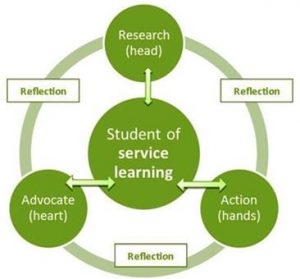
Action (hands)
‘Where ever possible this component should provide a series of ‘first hand’ experiences for students with a particular focus on students analysing their gifts and talents and connecting this with diverse global needs (that are both near and far).’
Action can either be direct or indirect based on the specific needs of the community and partnership.
Advocate (heart)
‘Educating the mind without educating the heart is no education at all.’ Aristotle
Standing up for others. Giving voice.
This component focuses on an explicit teaching of the meaning of advocacy and its different forms and forums. Advocacy is about making a difference through political and/or public education.
Research (head)
‘ Offer students opportunities to engage in problem-solving by requiring them to understand the specific context of their service learning activity and community challenges, rather than only to draw upon generalized or abstract knowledge from a textbook. As a result, service learning offers powerful opportunities to acquire the habits of critical thinking; ie the ability to identify the most important questions or issues within a real-world situation.’
Reflection
‘Reflection is more than summarizing and talking about feelings during the experience (it’s still important to do both of these). It should involve challenging thinking, analysis, problem solving and interpretation. Reflection experiences need to be intentionally structured to help participants internalise, interpret and apply their experiences, integrating into their knowledge and who they are. Reflection occurs before, during and after service –learning experience.’
RMC Research Corporation. (2007). Reflection in K-12 Service-Learning. Scotts Valley, CA: National Service-Learning Clearinghouse.